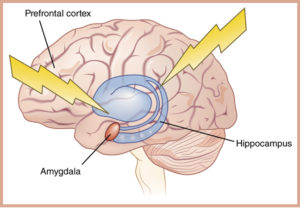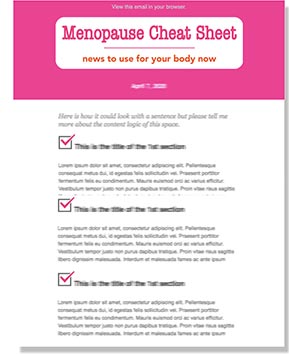Running late? Stuck in traffic? Nail polish chips right before a job interview? Contemplating your chipped nail while 
Life is filled with stressors, big and small. And guess what happens when you let them boss you around? A recent study published in The Lancet stated:
Heightened activity in the amygdala — a region of the brain involved in stress — is associated with a greater risk of heart disease and stroke.
Not good.
Which brings me to my new obsession. Forget about crows feet. I have much bigger fish to fry: lengthening my telomeres. Recent research underscores the importance of telomeres (the caps on the end of chromosomes; they look sort of like those plastic things at the ends of shoelaces) to our overall health, well-being, and how we ag
Here’s the quickie version of telomeres: when we’re young, they’re long, but as we get older they naturally start to get shorter. We want them longer, because longer telomeres=better health. The good news is that we have some control over the length of our telomeres. Exercise, eating well, and drum roll, please . . . managing stress . . . all help to keep telomeres long and healthy.
So, I recently made a list of things I could be doing (most of which I am!) to get and keep my telomeres long:
- exercise: check!
- eating well: check!
- limiting processed food: check!
- sleep enough: check!
- no smoking: check!
- manage stress: needs work.
That’s when I re-read the chapter in The Telomere Effect (a fabulous book on all things ‘telomere’) on the extremely close relationship between stress and telomeres and discovered a few fundamental truths about life: we all have stress. That’s a fact. It’s how we handle that stress that answers the question: “How long are my telomeres anyway?” Well, according to the authors (one is a world-renowned microbiologist who heads the Jonas Salk Institute and the other is a health psychologist) if you’re exercising, eating well, sleeping enough, and dealing with stress in a positive way (and not smoking!), you can safely assume your telomeres are the length they should be. However, if you haven’t figured out how to manage stress–which can wreak havoc with your brain and body–it’s possible that your telomeres could use some help.

But, after a long talk with myself during a particularly long run (which, I have always used as a form of meditation) I realized that I do, in fact, need to step up my meditation game if I’m going to truly comply with the prescription for successful and healthy aging.
And that’s when I discovered
the Magic of Micro-Meditation.
Instead of committing to an hour, I devote one, two, sometimes five or ten minutes to meditation throughout the day. It’s simple and I can do it anywhere, any time, even with my eyes open if I have to. I’ve taught myself (with a bit of help from a fabulous app — Headspace) how to focus on my breathing, bring my thoughts back and get them centered when they wander, and slow down my heart rate. I pull this little rabbit out of the hat whenever I need it, and it’s never failed to calm me down, soothe my soul, and make me smile.
This small-step healthy habit has been easy to incorporate into my life, and is, according to all research, a golden ticket to longer telomeres (and successful aging!).
Take a look at this video I did for AARP showing how truly simple micro-meditation is. Really . . . if I can do it, so can you. You don’t even have to say “Ohm”. Pinky swear.
































































